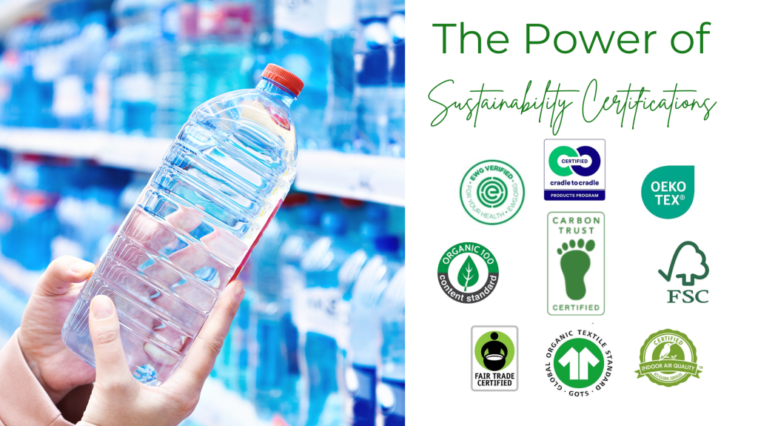With greenwashing regulations under construction, making green claims can be risky. However, supporting these claims with data-backed evidence and third-party validation can help them hold up in court. Third-party sustainability certifications can provide a backbone to simple and sometimes misused terms like carbon neutral, all-natural, or recyclable. The recent dismissal of a lawsuit against Evian demonstrates the importance of giving consumers accurate information and tools to evaluate whether sustainable attributes are worth the premium price.
The Evian Water Case—Dismissed
The class action lawsuit against Danone claimed that Evian’s use of the term “carbon neutral” could not be substantiated. The lawsuit argued that this phrase is an unqualified general environmental benefit claim under the FTC Green Guides. Furthermore, a reasonable consumer would not understand the meaning of “carbon neutral” from the label alone, making the term potentially misleading.
The first dismissal was denied, stating that the term “carbon neutral” was ambiguous, lacked clarity, and could potentially mislead a reasonable consumer. The court later reversed its decision after concluding that the information on the back label, which included a link to Evian’s website, would guide a reasonable consumer to the details regarding Evian’s carbon neutral claim, certified by Carbon Trust.
Following the FTC Green Guides
The FTC Green Guides are a vital resource for lawsuits; the plaintiffs in the Evian case referenced them to illustrate the misleading nature of the claim. The term “carbon neutral” does not appear in the FTC Green Guides, and in the Evian case, the court initially classified it as a general benefit claim, which the Guides advise marketers to avoid. An unqualified general environmental benefit claim conveys a wide range of meanings, and it is highly unlikely that all reasonable interpretations of these claims can be substantiated.
In the final dismissal, the court determined that the term “carbon neutral” is not a general benefit claim but rather a specific term tied to offsetting emissions to achieve a zero carbon footprint.
The Green Guides’ definitions and examples can help determine how to present your sustainability claims. The Guidelines are expected to be updated soon. Besides providing more information on particular terms, they are also expected to emphasize the need for sustainability certifications.
Back it Up: Ensuring Transparency with Trusted Sustainability Certifications
Sustainability certifications can educate customers about their decisions. They are essential for supporting sustainability claims and maintaining transparency. It is imperative, however, to back up your certification with data. The FTC Green Guides specify that a third-party certification does not free marketers from the responsibility of substantiating all claims made, including those implied by that certification.
In a lawsuit involving Hershey and the Rainforest Alliance (Yeh et al. v. The Hershey Co. and Rainforest Alliance Inc.), the claims are directed at both companies for featuring a Rainforest Alliance certification label on Hershey product packaging despite the Rainforest Alliance’s inability to verify that the cocoa was harvested responsibly. This case is still pending.
Find the Right Sustainability Certification
Finding the right sustainability certification solution for your brand or business can be challenging! Using Softly Solutions can simplify the process of finding the best one for your product or service. Making the right choice for a sustainability certification involves many steps, from understanding the benefits and key features of a certification to identifying your sustainability goals and priorities. We break down the steps so you can be sure you are getting the biggest return on your investment in ecolabels while reducing your impact on the planet!
Softly’s Green Claim Navigator offers a comprehensive list of relevant sustainability certifications and third-party validations for each sustainability claim to ensure brands match their claims with recognized standards and stay transparent.
Schedule a free consultation with Softly to learn more about choosing the right sustainability certification for your product.
Evolving Standards: Carbon Neutral
Evian’s certification by the Carbon Trust label verified that it was actively working to measure and reduce carbon emissions. Carbon Trust evaluates a product’s carbon footprint according to internationally recognized standards. The product can display the certification on its label to communicate its sustainability attributes to its customers.
Sustainability certifications are not static; they evolve to align with new standards. The Carbon Trust has recently updated its label claims to provide more detailed information about its sustainability certifications. Additionally, the Carbon Trust certification for Evian, previously labeled “Carbon Neutral,” has been phased out and replaced with more ambitious label claims with stricter requirements.
Moving Forward with Sustainability Certifications
What you put on your product labels should inform, not mislead, consumers. Educating consumers about your sustainability attributes can help you avoid misleading them. Information on labels can direct consumers to your website and certification information. Sustainability certifications, substantiated with data, can help you educate your customers, stay out of the courtroom, and keep your reputation intact.
Information provided is for general purposes only and not legal advice; consult a qualified attorney for personalized guidance. We disclaim any liability for actions based on this information.




GIPHY App Key not set. Please check settings